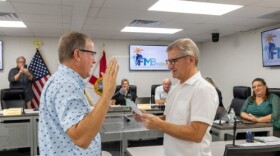Churches in the greater Tampa Bay region are breaking away from the United Methodist Church following divisions over beliefs and the ordaining of LGBTQ+ clergy.
The break-up has been a long time coming.
Unlike the quick splits for similar reasons in other mainstream Protestant churches across the country — such as the Presbyterian, Episcopal and Evangelical Lutheran churches — the divide in the United Methodist Church over ordination of LGBTQ+ clergy and same-sex marriage has been there for decades, with no exit strategy for member churches who wish to hold fast to their traditional beliefs.

Scott Thumma, who directs the Hartford Institute for Religion Research, said it's clear societal norms are shifting to a more progressive stance "than what a traditional interpretation of biblical texts have always been thought to support."
"And so the sexuality that LGBT kinds of issues are, are also just a part of that movement, in a sense, in the direction of where our whole society has moved," Thumma said.
But throughout U.S. history, Thumma said, denominations have fractured and merged.
"And so, while this seems dramatic and unusual, it's actually just part of the evolution of religious life and religious organizations throughout the history of our country," Thumma said.
Thumma said the churches that are leaving represent a minority voice in the UMC among U.S. congregations.
Now a path has been made, and churches like Palma Ceia United Methodist in South Tampa are leaving the denomination. The church released this disaffiliation statement on its website. It says, in part, the church has been divided “for many years over fundamental difference regarding the understanding, and interpretation of scripture, theology and practice.”
Earlier this year, the Florida Conference of the United Methodist Church put out information for churches wishing to leave the denomination. Bishop Tom Berlin, who began his term as the state's new resident bishop on Jan. 1, said, "We want all churches to remain..."
The pathway for disaffiliation comes as Paragraph 2553. According to the FLUMC website, it was adopted in 2019 at the General Conference, and it acknowledges "the current deep conflict within The United Methodist Church around issues of human sexuality."
Mandy New, executive director of New Hope UMC in Brandon, responded by email to WUSF's question about why the church is leaving the denomination.
"New Hope has always been strongly rooted in scripture and orthodox Christian beliefs. It is simply who we are. Unfortunately, we continued to see evidence of the UMC moving away from these fundamental beliefs," New wrote in the email. "The more the UMC drifted from both its mission and its theological foundation, the more obvious it was that we needed to go a different path.
"While human sexuality is the presenting issue in the ongoing debate within the UMC, the New Hope leadership team is concerned about much broader issues. These include, but are not limited to, differences in doctrine, social focus, organizational and financial matters, and clergy accountability."
Churches that wish to leave the denomination must undergo a process, laid out in the pathway from FLUMC, that must be completed before Dec. 31.
Thumma said that while some of the UMC churches are leaving the denomination, not all of the people who attend those churches will be remaining with that particular church. And while some of the churches will leave and join the newly formed Global Methodist Church, others will become non-denominational churches.
He said the impact of the disaffiliation won't be fully known until the process is complete, late this year.
Copyright 2023 WUSF 89.7.








